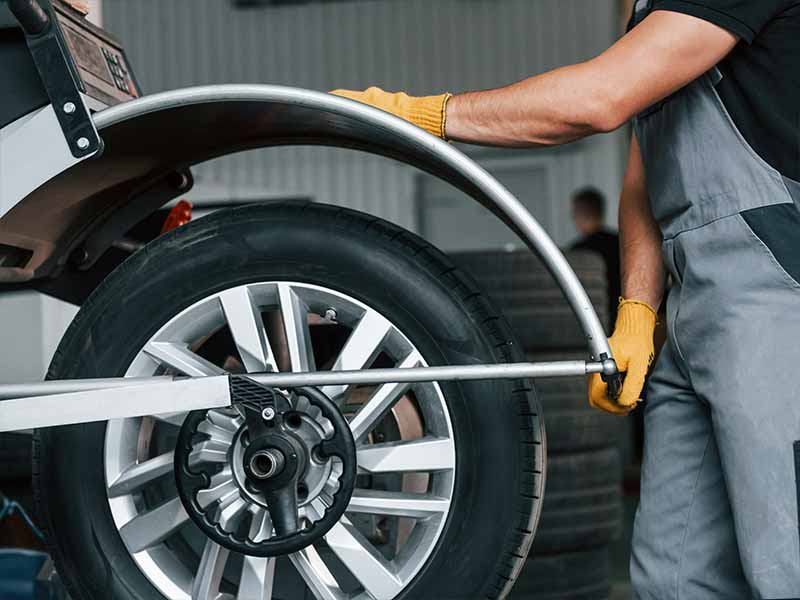Ever noticed a wobble in your steering wheel as you hit high speeds on the highway? That subtle shake isn’t just a passing annoyance—it could be signaling something important about your car’s health. Ready to find out what?
Steering Wheel Vibration At High Speeds
Steering wheel vibration at high speeds is often caused by tire imbalances, worn-out brake components, or wheel alignment issues. Addressing these primary culprits can typically resolve the vibrations and restore a smooth ride.
In this article, we’ll dive deep into understanding the basics behind steering wheel vibrations, pinpoint common causes, unveil the mystery of intermittent shakes, explore safety implications, and guide you on the steps to take when confronted with a jittery wheel.
Let’s take a closer look.

The Basics of Steering Wheel Vibration
What causes this steering wheel shake? Let’s review the basics.
Under the Hood
Your car is a complex piece of machinery with many moving parts. When everything is in harmony, your ride is smooth. But when something’s off, even by just a bit, that can lead to vibrations.
- Steering System: Think of this as the command center. You turn the wheel, and it tells your tires where to go. If there’s an issue with any part of this system, like worn-out parts, it could cause that dreaded shake.
- Tires: These are your car’s shoes. Just like when our shoes are uneven or worn out, and we might trip or stumble, if tires are unevenly worn or unbalanced, they can make your steering wheel vibrate.
Wheels and Tires
Being experts on tires, it’s crucial to emphasize their role. Tires and wheels have a close relationship with your steering wheel. Here’s how:
- Balance Matters: When we say a tire is ‘balanced’, we mean its weight is evenly distributed around the wheel. If it’s not, it can wobble, kind of like a washing machine with an uneven load. This wobble can send vibrations up to your steering wheel, especially at high speeds.
- Air Pressure: Just like you’d feel off if one shoe was tighter than the other, your car feels off if one tire has more air than another. Uneven air pressure can also cause vibrations.
- Uneven Wear and Tear: Roads are tough on tires. Over time, the tread wears down. If they wear unevenly, due to things like bad alignment, they can cause…you guessed it, vibrations!
Why Speed Intensifies the Shaking
Ever notice that the shaking gets worse at certain speeds? There’s a reason for that.
- Resonance: Every object has a natural frequency it likes to vibrate at. When your car hits that speed, which might be around 60 mph for some, the vibrations become more noticeable.
- Tire Issues Show Up: At higher speeds, any minor issue with your tires or wheels gets magnified. So, if there’s a slight imbalance in your tire, you’ll really feel it when you’re zooming down the highway.

Common Reasons for Steering Wheel Vibrations
Here are some of the main culprits:
Tires and Wheels
- Imbalance: Tires can become imbalanced over time or due to uneven wear. This imbalance often leads to noticeable vibrations in the steering wheel.
- Wear Patterns: Tires that have been worn down unevenly, often due to alignment issues or lack of rotation, can contribute to shaking.
- Damages: Physical damage to the tire, like bulges or punctures, can also be a source of vibration.
Brake System
- Worn Brake Rotors: When brake rotors wear unevenly or get warped, they can cause the steering wheel to shake when braking.
- Faulty Brake Calipers: These are the components that apply pressure to the brake rotors. If they malfunction, it can lead to vibrations.
Vehicle Alignment and Suspension
- Misalignment: If your car’s wheels aren’t aligned properly, it can lead to various issues, including vibrations in the steering wheel.
- Suspension Issues: The suspension system absorbs shocks and ensures a smooth ride. Damaged or worn-out suspension components can be a major cause of steering wheel trembles.

Steering Wheel Shakes then Goes Away
Occasionally, drivers might encounter a puzzling scenario where the steering wheel vibrates and then, seemingly on its own, the shaking stops. This intermittent vibration can be as perplexing as it is concerning.
Let’s unpack some possible explanations:
Speed-Dependent Vibrations
- Tire Balancing: Sometimes, the vibration might be prominent at a specific speed range. For instance, you might notice the shaking between 55 and 65 mph, but it diminishes as you either slow down or accelerate beyond this range. This is commonly linked to tire balancing issues.
Temporary Deformities
- Flat Spots: After a car has been stationary for a prolonged period, especially in colder climates, tires can develop temporary flat spots. As the tire warms up from driving, these flat spots can even out, resolving the vibration.
External Factors
- Road Conditions: In some instances, it’s not the car but the road. Uneven or gravelly road surfaces can induce vibrations that cease once smoother terrain is reached.
Brake Conditions
- Rust on Brake Rotors: After a rainy spell or washing your car, a thin layer of rust can form on brake rotors. The initial braking might cause vibrations, but as the brake pads wear off the rust, the shaking decreases.

Safety Concerns of a Shaking Steering Wheel
Understanding the implications of steering wheel shaking is crucial for ensuring a safe driving experience.
Potential Risks of Overlooking Vibrations
Ignoring vibrations can lead to more severe problems down the road:
- Loss of Control: Persistent or sudden vibrations can impair vehicle control, particularly at higher speeds.
- Tire Complications: Vibrations might indicate tire damage or wear. A compromised tire can increase the risk of blowouts or punctures.
- Brake System Malfunctions: If the vibrations are more pronounced during braking, this might suggest problems within the braking system, which is critical for vehicular safety.
The Extended Impact on the Vehicle
A vibrating steering wheel can affect other parts of the vehicle:
- Increased Wear: Persistent vibrations can accelerate wear on parts of the steering mechanism and the suspension system.
- Alignment Issues: Prolonged vibration can result in wheel alignment problems, affecting both tire longevity and vehicle stability.
Recognizing Serious Warning Signs
All vibrations aren’t created equal. Some warrant immediate attention:
- Severity of Vibrations: A gentle tremor is different from a pronounced shake. The latter demands swift action.
- Consistency: If the vibration is continuous, especially if known issues have been addressed, it might suggest a more significant underlying problem.
- Accompanying Sounds: If you notice any unusual sounds (like grinding or clunking) accompanying the vibrations, it’s time to consult a professional.

What to Do When Steering Wheel Shakes at High Speeds
A vibrating steering wheel at high speeds can be alarming. Taking the right steps can ensure your safety and address the root of the problem.
Immediate Steps During an Incident
Should you experience severe vibrations while driving:
- Maintain Composure: Stay calm and ensure you have a firm grip on the steering wheel.
- Reduce Speed: Gently decrease your speed. It’s advisable to avoid abrupt braking unless in an emergency.
- Safely Pull Over: When it’s safe to do so, find a place to pull over and inspect your vehicle. Activate your hazard lights.
Regular Vehicle Checks
Conducting routine inspections can help in identifying and preventing potential issues:
- Tire Inspection: Regularly check your tires for signs of uneven wear, damages, or objects embedded in them. Ensure they’re inflated to the recommended pressure.
- Brake System Check: If you notice vibrations predominantly when braking, it might suggest an issue with the brake system.
- Wheel Alignment: If the car tends to drift to one side without steering input, consider checking the wheel alignment.
Seek Expert Assistance
For persistent or severe issues, seeking professional help is the best course of action:
- Consult a Mechanic: Detail your observations and concerns to a trusted mechanic. The more specific you can be about the problem, the better.
- Regular Maintenance: Adhering to the vehicle’s recommended service schedule can preempt many issues before they become significant.
- Visit a Tire Specialist: Since a considerable number of vibration problems relate to tires, seeking an expert’s opinion can be invaluable.
When to Consider Replacements
If diagnostic checks and minor adjustments don’t alleviate the problem:
- Replace Tires: Consider replacing tires if they’re damaged, excessively worn, or have been in use for an extended period.
- Examine Steering Components: Over time, some parts of the steering mechanism may wear out and require replacement.
Resources
Below are some links you may find helpful when learning about tires
Final Thoughts
Steering wheel shaking, especially at high speeds, aren’t just disconcerting—they can signal underlying issues with your vehicle. More often than not, the root causes lie in tire imbalances, wheel alignment discrepancies, or brake system wear and tear. It’s crucial not only to recognize these signs but to address them promptly, ensuring both your comfort and safety on the road.
Remember, while those shakes might start as mere annoyances, timely action can prevent them from evolving into serious safety hazards. So the next time your steering wheel throws a little dance, you’ll know it’s more than just a quirk—it’s a cue to check in with your vehicle’s health.
Good luck and happy motoring.





